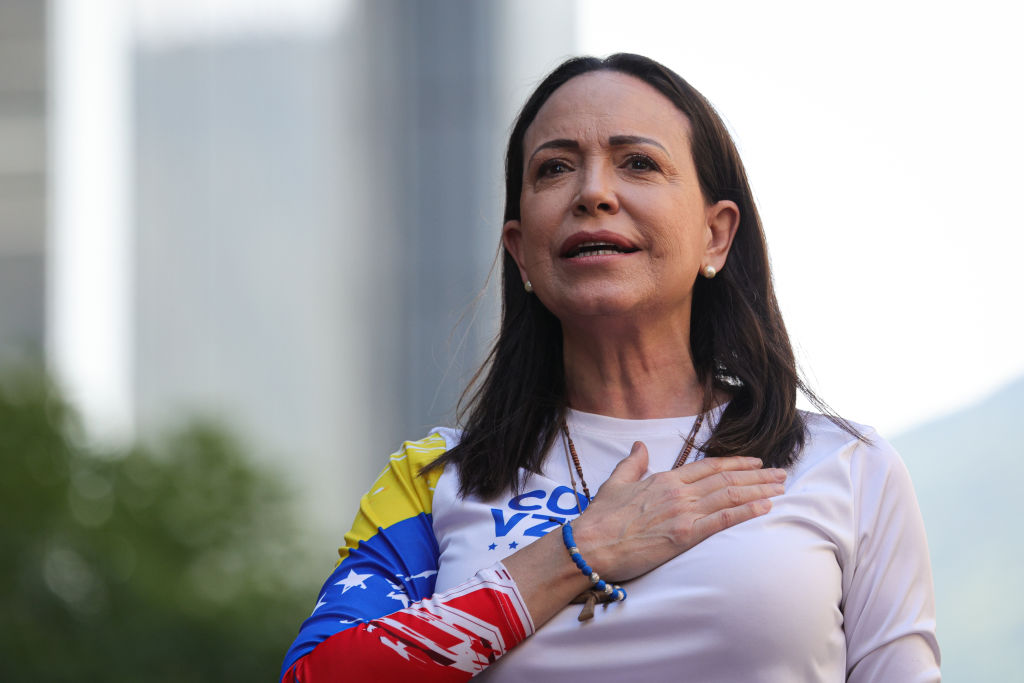The Nobel Peace Prize Committee Goes to War
The walls are closing in on Maduro, and the Norwegians have made their own contribution.

The stars are aligning for María Corina Machado, the long-suffering Venezuelan activist and politician who was awarded the Nobel Peace Prize Friday.
Not too long ago, the situation for Venezuela’s “Iron Lady” looked bleak. Machado headed up the effort to oust current Venezuelan presidential strongman Nicolás Maduro democratically during the 2024 election—an effort that failed when the Venezuelan electoral commission blatantly falsified the results to secure yet another term for Maduro. The domestic protest movement she headed up also fizzled out after key opposition leaders were arrested, disappeared, or fled the country to avoid the long arm of the Venezuelan government. Now she’s in hiding, coordinating the remaining resistance inside the country and stumping outside the country for support via social media.
But while homegrown efforts to push Maduro out of power at the ballot box or in the streets failed, Machado has received a reprieve from an unexpected source: U.S. President Donald Trump, whose administration has made an aggressive confrontation of the Venezuelan regime a key feature of its foreign policy platform in the Western Hemisphere. American naval and air assets have flooded into the Caribbean, and which now hosts four Arleigh Burke–class destroyers, a guided missile cruiser, a Marine amphibious ready group, an attack submarine, and a flight of F-35 fighter jets deployed in Puerto Rico.
This is the largest concentration of military force the region has seen in years, ostensibly tasked with halting the flow of drugs into the U.S. from routes over the Caribbean. And while several small boats allegedly carrying cargoes of illicit drugs have been dramatically blown from the water over the past several weeks, there has been a sneaking suspicion from all sides that this is merely the harbinger of military operations against the Venezuelan government.
Maduro certainly believes that American action against him is a possibility. His government sent a letter to the United Nations Thursday requesting an emergency meeting in anticipation of an “armed attack” against the country that could take place “in a very short time.” President Gustavo Petro of Colombia has put the nation’s armed forces on alert for a potential invasion of the neighboring country.
The Trump administration has done little to signal pacific intentions. Secretary of State Marco Rubio has repeatedly stated that the U.S. does not view Maduro as the “legitimate president” of Venezuela, due to his electoral manipulation. The U.S. has also made clear that it considers Maduro to be the criminal head of the Cartel de los Soles and Tren de Aragua, and recently increased the bounty for his capture to $50 million. According to a New York Times report that released Friday, the administration even rejected a full-spectrum diplomatic capitulation from the Venezuelan government that would have “offered to open up all existing and future oil and gold projects to American companies, [given] preferential contracts to American businesses, [reversed] the flow of Venezuelan oil exports from China to the United States, and [slashed] his country’s energy and mining contracts with Chinese, Iranian and Russian firms.”
From all appearances, the United States is out for Maduro’s head.
Now, events are swinging Machado’s way, and she has flexed her political talents to the utmost to steer them in her desired direction. The latest coup comes with her acquisition of a Nobel Peace Prize, for showing “that the tools of democracy are also the tools of peace”—a description that may go down as one of the more ironic tributes, as Machado has been quick to turn her Peace Prize award into one more weapon of war.
The award could have come as a blow to the U.S. campaign against Maduro—Trump has made it clear that he believes he should be awarded the prize, including during his speech to the UN General Assembly. But Machado immediately made a diplomatic overture to the president. “Today, more than ever, we count on President Trump, the people of the United States, the peoples of Latin America, and the democratic nations of the world as our principal allies to achieve Freedom and democracy,” she wrote on X. “I dedicate this prize to the suffering people of Venezuela and to President Trump for his decisive support of our cause!”
The play seems to have paid off. Trump reshared her dedication on his Truth Social platform and spoke to her later on Friday over the phone. “The person who actually got the Nobel Prize called today, called me and said, ‘I’m accepting this in honor of you, because you really deserved it,’” he told reporters. “A very nice thing to do.”
Subscribe Today
Get daily emails in your inbox
“I’ve been helping her along the way. They need a lot of help in Venezuela, it’s a basic disaster. So, and you could also say it was given out for ’24 and I was running for office in ’24,” the president added, referring to the nomination deadline for the Nobel, which closed in January at the very beginning of his presidency.
Far from denting the president’s relationship with the Venezuelan opposition, the Nobel committee seems to have set the stage for closer collaboration against Maduro. Trump may already have a good case for the next award of the prize he covets, if his peace settlement in Gaza holds. But he may consider—not unreasonably—that kicking a certain South American dictator out of office would be a very strong addition to his resumé.
As for Machado, her patient and unbreakable show of resistance against the Venezuelan government at a time when nearly all other opposition leaders have fled the country is paying major dividends. She will almost certainly play a leading role in leading any government coming out of an American intervention in the country, a situation that every day looks more and more probable.